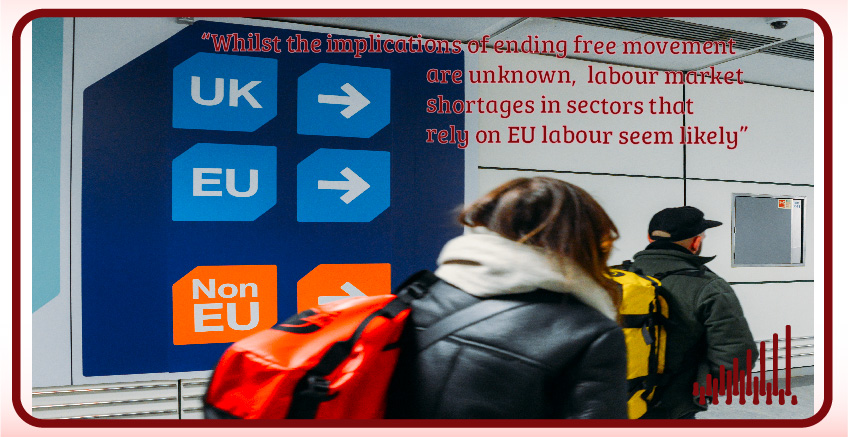Youth Mobility Schemes: The Panacea for Ending Free Movement?
Free movement has been at the heart of the Brexit debate. The government are in a tricky situation; grappling between a public which is assumed to want free movement to end, and businesses decrying demands for flexible migrant labour. In a labour market that relies on EU labour in sectors such as retail, hospitality and social care, the end of free movement raises major questions as to how labour market shortages will be filled.

Free movement has been at the heart of the Brexit debate. The government are in a tricky situation; grappling between a public which is assumed to want free movement to end, and businesses decrying demands for flexible migrant labour. In a labour market that relies on EU labour in sectors such as retail, hospitality and social care, the end of free movement raises major questions as to how labour market shortages will be filled. Whilst the government have yet to decide what Britain’s future immigration system will look like, a possible remedy proposed by the Conservative government in their 2018 White Paper is to establish an EU wide Youth Mobility Scheme for young EU citizens modelled on the current Tier 5 Youth Mobility Scheme on the assumption that YMS migrants undertake low skilled work.
The UK’s Youth Mobility Scheme – previously known as the Working Holidaymakers Scheme – has long been a passage for young migrants to combine tourism whilst working in the UK. Originally established to facilitate Commonwealth mobility, it is a strictly temporary scheme, which allows migrants from eight nations – Australia, Canada, Japan, Monaco, New Zealand, Hong Kong, Republic of Korea and Taiwan – to work in the UK unrestricted for up to two years. Participants must be aged between 18 and 30. Each participating nation is allocated a certain percentage of YMS visas, with Australians receiving the most. In some ways this is a very liberal visa, as it allows migrants to work without an employer sponsoring them, unlike the main Tier 2 visa. This means migrants on a YMS visa can work in any sector or skill level. But this also means the government have little knowledge of what sorts of jobs current Youth Mobility Migrants work in.
Our research drawn from the Temper project, provides some speculative, although non-representative findings. We surveyed 75 and interviewed 20 Australians living in London on a YMS visa. We found that the majority of respondents were high skilled, and were working in high skilled jobs such as teachers, software developers and legal advisors. Many Australians use recruitment companies’ set up specifically to facilitate Australians with temporary jobs in the UK, and very few had problems acquiring employment. Most were working on fixed term or zero hour contracts but these young Australians were very content with their precarious contracts because the main reason they migrated was to travel: ‘You just have to work to sustain travel’ (Female 25).
We found that moving to London was often undertaken as a rite of passage for these young migrants, a moment to self-explore before ‘growing up’. The biggest draw to London and the reason why the majority migrate to the UK is conversely to travel Europe. Almost all of our respondents had travelled extensively to Europe. These young Australians weren’t so much drawn to the UK – in fact very few had been outside London – it was the cosmopolitanism of London specifically and particularly because the capital offers easy travel opportunities to Europe:
People said London is a multicultural city. And you’re like of course it is, it’s one of the biggest cities and it’s in Europe. But in my head I didn’t expect it to be this multicultural. In my head I’d painted a picture of a normal day in London, and I wouldn’t have imagined so many varieties of culture, especially coming from Australia where we are multicultural but we’re still pretty damn white. So for example we’d never seen an Orthodox Jew before! It’s really broadened our ideas of religion and cultures (Female 28, Male 26)
Nonetheless the fact that the UK is an English-speaking nation with similar cultural, political and social institutions to Australia also made the UK an ideal destination; a place that was familiar but also offered some excitement.
Whilst the implications of ending free movement are unknown, labour market shortages in sectors that rely on EU labour, especially low and mid skilled sectors, seem likely. Although our sample was non-representative our findings call into question the assumption that young temporary migrants undertake only low skilled work. More importantly, our findings show that YMS – Australians at least – are mainly invested in travelling Europe. Given that EU citizens can freely travel, work and reside in all Member States, there is little reason to believe that the UK would be attractive for young EU citizens in this respect. If the government were to establish the YMS as an EU wide scheme it would do well to consider expanding residency rights such as allowing EU migrants to switch to the Tier 2 visa rather than making this an exclusively temporary route. Evidently, even providing for a more attractive visa may not be enough to attract EU migrants to a country that is seen to have a reputation for being hostile to immigrants.
You can find Erica’s full article here
Dr Erica Consterdine is a Research Fellow in Geography/Sussex Centre Migration Research (SCMR), University of Sussex.














